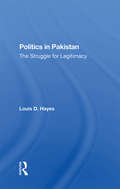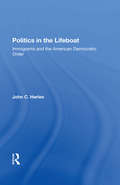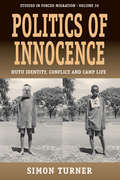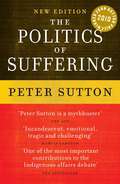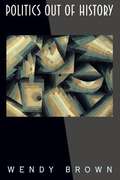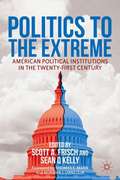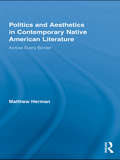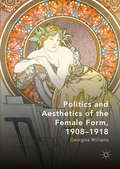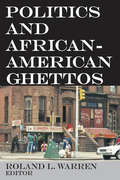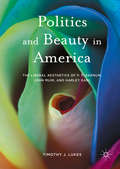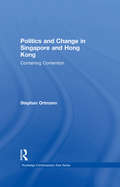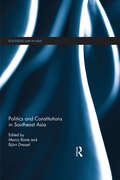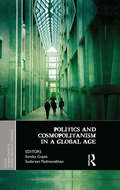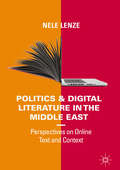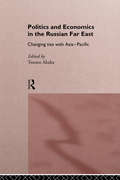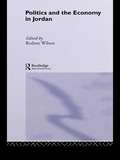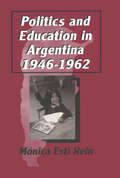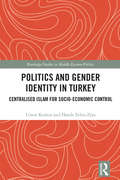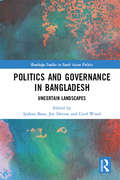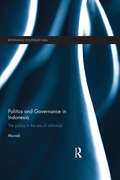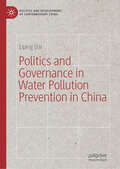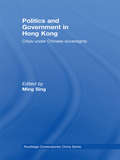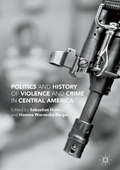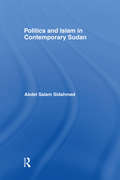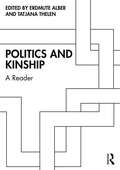- Table View
- List View
Politics In Pakistan: The Struggle For Legitimacy
by Louis D HayesFocusing on the problems associated with Pakistan's political development, this book identifies and evaluates the factors that have determined the effectiveness of the country's political institutions. Professor Hayes examines the relationship of Islamic values to political organization and public policy and discusses the basic features of the coun
Politics In The Lifeboat: Immigrants And The American Democratic Order
by John C. HarlesAs an ethnically heterogeneous but stable democracy, the United States is a puzzle for students of politics. Typically, the literature of democratic theory regards ethnic diversity as disruptive of a democratic polity. However, the United States has so far avoided the system-threatening consequences of heterogeneity experienced by other democratic
Politics Of Innocence: Hutu Identity, Conflict and Camp Life (Forced Migration #30)
by Simon TurnerBased on thorough ethnographic fieldwork in a refugee camp in Tanzania this book provides a rich account of the benevolent "disciplining mechanisms" of humanitarian agencies, led by the UNHCR, and of the situated, dynamic, indeterminate, and fluid nature of identity (re)construction in the camp. While the refugees are expected to behave as innocent, helpless victims, the question of victimhood among Burundian Hutu is increasingly challenged, following the 1993 massacres in Burundi and the Rwandan genocide. The book explores how different groups within the camp apply different strategies to cope with these issues and how the question of innocence and victimhood is itself imbued with ambiguity, as young men struggle to recuperate their masculinity and their political subjectivity.
Politics Of Suffering: Indigenous Australia and The End of the Liberal Consensus
by Peter SuttonIn this ground breaking book, Peter Sutton asks why, after three decades of liberal thinking, has the suffering and grief in so many Aboriginal communities become worse? The picture Sutton presents is tragic. He marshals shocking evidence against the failures of the past, and argues provocatively that three decades of liberal consensus on Aboriginal issues has collapsed. Sutton is a leading Australian anthropologist who has lived and worked closely with Aboriginal communities. He combines clear-eyed, original observation with deep emotional engagement. The Politics of Suffering cuts through the cant and offers fresh insight and hope for a new era in Indigenous politics. 'Incandescent, emotional, tragic and challenging' - Marcia Langton
Politics Out Of History
by Wendy BrownWhat happens to left and liberal political orientations when faith in progress is broken, when both the sovereign individual and sovereign states seem tenuous, when desire seems as likely to seek punishment as freedom, when all political conviction is revealed as contingent and subjective? Politics Out of History is animated by the question of how we navigate the contemporary political landscape when the traditional compass points of modernity have all but disappeared. Wendy Brown diagnoses a range of contemporary political tendencies--from moralistic high-handedness to low-lying political despair in politics, from the difficulty of formulating political alternatives to reproaches against theory in intellectual life--as the consequence of this disorientation. Politics Out of History also presents a provocative argument for a new approach to thinking about history--one that forsakes the idea that history has a purpose and treats it instead as a way of illuminating openings in the present by, for example, identifying the haunting and constraining effects of past injustices unresolved. Brown also argues for a revitalized relationship between intellectual and political life, one that cultivates the autonomy of each while promoting their interlocutory potential. This book will be essential reading for all who find the trajectories of contemporary liberal democracies bewildering and are willing to engage readings of a range of thinkers--Freud, Marx, Nietzsche, Spinoza, Benjamin, Derrida--to rethink democratic possibility in our time.
Politics To The Extreme
by Scott A. Frisch Sean Q KellyTo overcome the political deadlock that overshadows the pressing problems facing the United States, the academies top scholars address the causes and consequences of polarization in American politics, and suggest solutions for bridging the partisan divide.
Politics and Aesthetics in Contemporary Native American Literature: Across Every Border (Indigenous Peoples and Politics)
by Matthew HermanOver the last twenty years, Native American literary studies has taken a sharp political turn. In this book, Matthew Herman provides the historical framework for this shift and examines the key moments in the movement away from cultural analyses toward more politically inflected and motivated perspectives. He highlights such notable cases as the prevailing readings of the popular within Native American writing; the Silko-Erdrich controversy; the ongoing debate over the comparative value of nationalism versus cosmopolitanism within Native American literature and politics; and the status of native nationalism in relation to recent critiques of the nation coming from postmodernism, postcolonialism, and subaltern studies. Herman concludes that the central problematic defining the last two decades of Native American literary studies has involved the emergence in theory of anti-colonial nationalism, its variants, and its contradictions. This study will be a necessary addition for students and scholars of Native American Studies as well as 20th-century literature.
Politics and Aesthetics of the Female Form, 1908-1918
by Georgina WilliamsThis book examines the pictorial representation of women in Great Britain both before and during the First World War. It focuses in particular on imagery related to suffrage movements, recruitment campaigns connected to the war, advertising, and Modernist art movements including Vorticism. This investigation not only considers the image as a whole, but also assesses tropes and constructs as objects contained within, both literal and metaphorical. In this way visual genealogical threads including the female figure as an ideal and William Hogarth’s 'line of beauty' are explored, and their legacies assessed and followed through into the twenty-first century. Georgina Williams contributes to debates surrounding the deliberate and inadvertent dismissal of women’s roles throughout history, through literature and imagery. This book also considers how absence of a pictorial manifestation of the female form in visual culture can be as important as her presence.
Politics and African-American Ghettos
by Roland L. WarrenThe black ghetto is a byproduct of American social policy. It came into being within policies that were adopted - deliberately or inadvertently - and will persist, in the absence of drastic changes in policy. "Politics and the Ghettos" searches out the policy-making processes that have created the ghetto and that maintain it. Roland L. Warren has assembled, in this volume, the work of researchers who examine complex forces and counter forces which result in perpetuating in our cities areas in which poverty, poor housing, inadequate education, and involuntary segregation converge to form a black ghetto.This work present a variety of points of view, strongly held and at times hotly contested, searching out the relevant policymaking processes in various sectors and levels of American society. For example, Norton Long discusses the ghetto's particular failing: a social and political structure based on lower-class culture and lacking strong middle-class leaders.Roland Warren suggests that the "ghetto system" does not make the individual part of the larger society, but causes people to view it with fear and anger. Robert Wood examines the way big-city policy is made - or left unmade - in regard to ghettos. Charles Adrian discusses the relation of state governments to city ghettos. Daniel Elazar asserts that the current ferment for local control is a return to sound principles of American federalism based on "noncentralization, territorial democracy, and partnership." Charles Schottland documents the role of giant bureaucracies - in the federal government and in nongovernmental organizations in influencing social welfare policy. Whitney Young, Jr., indicates political pathways open to those who desire an active part in attacking the ghetto system.This provocative work raises disturbing questions having to do with the processes through which American ghettos are created and sustained, processes that must be altered if problems inherent in the black ghetto are to be attacked effectively. For concerned students, scholars, and laymen, it affords new insights into the phenomenon of the contemporary African-American network and its perplexing durability.
Politics and Beauty in America
by Timothy J. J. LukesThis book holds classical liberalism responsible for an American concept of beauty that centers upon women, wilderness, and machines. For each of the three beauty components, a cultural entrepreneur supremely sensitive to liberalism's survival agenda is introduced. P. T. Barnum's exhibition of Jenny Lind is a masterful combination of female elegance and female potency in the subsistence realm. John Muir's Yosemite Valley is surely exquisite, but only after a rigorous liberal education prepares for its experience. And Harley Earl's 1955 Chevrolet Bel Air is a dreamy expressionist sculpture, but with a practical 265 cubic inch V-8 underneath. Not that American beauty has been uniformly pragmatic. The 1950s are reconsidered for having temporarily facilitated a relaxation of the liberal survival priorities, and the creations of painter Jackson Pollock and jazz virtuoso Ornette Coleman are evaluated for their resistance to the pressures of pragmatism. The author concludes with a provocative speculation regarding a future liberal habitat where Emerson's admonition to attach stars to wagons is rescinded.
Politics and Change in Singapore and Hong Kong: Containing Contention (Routledge Contemporary Asia Series)
by Stephan OrtmannIn democratization theory, Singapore continues to be a remarkable country for its extremely low level of contentious politics despite rapid economic development. In contrast, many different groups in Hong Kong have taken their demands to the streets since the 1970s. Even though there is an obvious difference in the willingness of the population to actively challenge the regime, the political developments of the two city-states show a similar pattern of political mobilization and government reaction. This book examines the changing pattern of contentious politics in the democratization process of these Asian city-states. It explores the causal connections between popular contention and democratization, using a multi-disciplinary approach with theoretical insights from the political sciences, sociology and psychology. The political process model is applied to provide further understanding of the patterns of interaction between contenders, opposition groups or social movements and the ruling elite. The book argues that differences in the strategies applied by the ruling elite explain why members of the opposition were empowered or obstructed in challenging the government.
Politics and Constitutions in Southeast Asia (Routledge Law in Asia)
by Marco Bünte Björn DresselIn recent years the constitutional landscape of Southeast Asia has changed tremendously. Against a worldwide background of liberalization, globalization, and democratization, states in the region have begun to alter their constitutions, reinforcing human rights provisions, and putting in place institutional safeguards, such as constitutional courts and human rights commissions. On closer examination, however, the picture is very complex, with constitutional developments differing greatly between states. This book explores a range of current constitutional developments in the different states of Southeast Asia through a distinct political lens. Drawing on comparative and single case studies, it considers various constitutional areas, including constitution drafting, human rights, legal safeguards and the continuing role of the military, sets constitutional developments in the wider political and historical context of each country, and makes comparisons both with Western democracies and with other developing regions. The book concludes by assessing overall how far constitutional practices and trajectories are converging towards a liberal Western model or towards a distinctly Southeast Asian model.
Politics and Cosmopolitanism in a Global Age (Ethics, Human Rights and Global Political Thought)
by Sonika Gupta Sudarsan PadmanabhanThis book offers a unique reconceptualization of cosmopolitanism. It examines several themes that inform politics in a globalized era, including global governance, international law, citizenship, constitutionalism, community, domesticity, territory, sovereignty, and nationalism. The volume explores the specific philosophical and institutional challenges in constructing a cosmopolitan political community beyond the nation state. It reorients and decolonizes the boundaries of ‘cosmopolitanism’ and questions the contemporary discourse to posit inclusive alternatives. Presenting rich and diverse perspectives from across the world, the volume will interest scholars and students of politics and international relations, political theory, public policy, ethics, and philosophy.
Politics and Digital Literature in the Middle East: Perspectives On Online Text And Context
by Nele LenzeDuring the 2000's, online literature in Arabic language was popular among a larger readership. Writings on subjects dealing with politics, globalization, and social matters gained are well-received. While mapping the genre, this monograph shows literary developments in print and digital during these peak years to provide a historical context for the material. Online literary culture is linked to social, economic, and political developments within the last two decades. This book presents the differences between online and print literature as it relates to writer-readership interaction, literary quality, language and style, critical reception, and circulation. The geographic location of the analysis focuses on Gulf countries featuring a comparative study of Egypt and Lebanon.
Politics and Economics in the Russian Far East: Changing Ties with Asia-Pacific
by Tsuneo AkahaPolitics and Economics in the Russian Far East addresses the key issue of what the Russian Far East and its Northeast Asian neighbours can do to further closen economic and co-operative relationships. The question of to what extent the state should intervene to stimulate economic growth in the Russian Far East is covered, as are the options for a more laissez-faire approach. The possibilities for economic co-operation with the more successful market economies of the region are discussed as are the problems and opportunities presented by the exploitation of Russia's vast natural resources.This book will be essential reading for all those wishing to obtain a deeper understanding of the complexity of the issues involved in the development of co-operative relationships between Russia and its Asia-Pacific neighbours.
Politics and Economy in Jordan (SOAS/Routledge Studies on the Middle East)
by Rodney WilsonJordan occupies centre stage in both Middle Eastern and Arabic politics, yet the kingdom itself is comparatively under-researched. This volume contains contributions from some of Jordan's most respected academics in the field of geography, economics and political science. A number of international specialists in Jordan have also made valuable contributions. The work covers important aspects of the Jordanian economic and political scene which have not yet been written about in English. Aspects of Jordan's consumer society are examined, including the question of foreign aid support, the role of the private sector, and the demand for consumer durables. The economic vulnerability which an open consumer society faces is illustrated in the chapter on the balance of payments and inflation. Despite economic and political problems, it is argued that Jordan has exhibited a certain economic resilience and that a national identity has been successfully fostered.
Politics and Education in Argentina, 1946-1962
by Monica ReinThis study focuses on the formal education system in Argentina during the 1940s, the 1950s, and the early 1960s. It analyzes the link between politics and education against the backdrop of changing social conditions in Argentina under the regimes of Peron, Lonardi and Aramburu (the Liberating Revolution), and Frondizi, by evaluating textbooks, official bulletins, childrens' periodicals, speeches, and personal interviews.
Politics and Gender Identity in Turkey: Centralised Islam for Socio-Economic Control (Routledge Studies in Middle Eastern Politics)
by Umut Korkut Hande Eslen-ZiyaThe creation of Turkish nationhood, citizenship, economic transformation, the forceful removal of minorities and national homogenisation, gender rights, the position of armed forces in politics, and the political and economic integration of Kurdish minority in Turkish polity have all received major interest in academic and policy debates. The relationship between politics and religion in Turkey, originating from the early years of the Republicanism, has been central to many – if not all – of these issues. This book looks at how centralized religion has turned into a means of controlling and organizing the Turkish polity under the AKP (Justice and Development Party) governments by presenting the results from a study on Turkish hutbes (mosque sermons), analysing how their content relates to gender roles and identities. The book argues that the political domination of a secular state as an agency over religion has not suppressed, but transformed, religion into a political tool for the same agency to organise the polity and the society along its own ideological tenets. It looks at how this domination organises gender roles and identities to engender human capital to serve for a neoliberal economic developmentalism. The book then discusses the limits of this domination, reflecting on how its subjects position themselves between the politico-religious authority and their secular lives. Written in an accessible format, this book provides a fresh perspective on the relationship between religion and politics in the Middle East. More broadly, it also sheds light on global moral politics and illiberalism and why it relates to gender, religion and economics.
Politics and Governance in Bangladesh: Uncertain Landscapes (Routledge Studies in South Asian Politics)
by Ipshita Basu, Joe Devine and Geof WoodSince its Independence in 1971, Bangladesh has made remarkable progress in terms of reducing poverty levels, achieving high levels of economic growth over a sustained period of time, and meeting its Millennium Development Goals (MDG) targets set by the United Nations. With some justification, Bangladesh is considered an international development success story, and the country appears to be well on track to meet its policy target of becoming a middle-income country by 2021, the same year the country will celebrate 50 years of Independence. This book explores the central issue of Bangladeshi politics: the weakness of governance. The coexistence of a poor governance track record and a relatively strong socioeconomic performance makes Bangladesh an intriguing case which throws up exciting and relevant conceptual and policy challenges. Structured in four sections - Political Settlement, Elites and Deep Structures; Democracy, Citizenship and Values; Civil Society, Local Context and Political Change; Informality and Accountability – the book identifies and engages with these challenges. Chapters by experts in the field share a number of conceptual and epistemological principles and offer a combination of theoretical and empirical insights, and cover a good range of contemporary issues and debate. Employing a structurally determinist perspective, this book explains politics and society in Bangladesh from a novel perspective. Academics in the field of governance and politics in developing countries, with a focus on South Asia and Bangladesh will welcome its publication.
Politics and Governance in Indonesia: The Police in the Era of Reformasi (Rethinking Southeast Asia)
by MuradiHow does an authoritarian state reform its police force following a transition to democracy? In 1998, Indonesia, the third largest country in the world, faced just such a challenge. Policing had long been managed under the jurisdiction of the military, as an instrument of the Suharto regime – and with Suharto abruptly removed from office, this was about to change. Here we see how it changed, and how far these changes were for the better. Based on direct observations by a scholar who was involved in the last days of the New Order and who saw how the police responded to regime change, this book examines the police, the new regime, and how the police was disassociated from the military in Indonesia. Providing a comprehensive historical overview of the position of police in this change of regime, the book focuses on two key areas: the differences between local and national levels, and the politicisation associated with decentralisation. Arguing that the disassociation of the Indonesian National Police from the military has achieved only limited success, the book contends that there is continued impetus for the establishment of a professional police force and modern and democratic policing, which will entail effective public control of the police. A pioneering study of the police in Indonesia, examining key issues in the post-Suharto era, this book will be of interest to scholars of Southeast Asian politics and of policing and politics in the developing world.
Politics and Governance in Water Pollution Prevention in China (Politics And Development Of Contemporary China Series)
by Liping DaiThis book applies an interdisciplinary governance assessment framework to assess China’s water quality governance from a holistic point of view. The project explores China’s water quality status, water policy discourses, water regulations, public participation in water governance, the path towards green water law, eco-compensation approach in water quality management and the implementation mechanism for achieving water goals. It will appeal to academics in water law, researchers and practitioners dealing with water management, as well as a general audience interested in water issues.
Politics and Government in Hong Kong: Crisis under Chinese sovereignty (Routledge Contemporary China Series #Vol. 34)
by Ming SingThis book examines the government of Hong Kong since its handover to mainland China in 1997, focusing in particular on the anti-government mass protests and mobilisations in the years since 2003. It argues that Hong Kong has been poorly governed since transferring to Chinese rule, and that public frustration with governmental performance, including anti-subversion laws and slow democratisation, has resulted in the regular and massive protests, which have been rare in Hong Kong's past political development. The book then assesses different explanations for Hong Kong's government problems, including lack of social cohesion, incomplete economic restructuring, structural budgetary deficit, severe social inequality, intensifying cronyism and deficiencies within the political system itself. It goes on to discuss the implications of poor governance for legislative elections, civil society and constitutional development, and considers the prospects for the future. It argues that although in the short-term the Hong Kong government has managed to maintain its popular support ratings, in the longer run it is unlikely to be able to maintain its legitimacy in dealing with the fundamental challenges of government unless the current system is replaced by popular election of the government with appropriate institutional capacity and political powers.
Politics and History of Violence and Crime in Central America
by Sebastian Huhn Hannes Warnecke-BergerThis book highlights historical explanations to and roots of present phenomena of violence, insecurity, and law enforcement in Central America. Violence and crime are among the most discussed topics in Central America today, and sensationalism and fear of crime is as present as the increase of private security, the re-militarization of law enforcement, political populism, and mano dura policies. The contributors to this volume discuss historical forms, paths, continuities, and changes of violence and its public and political discussion in the region. This book thus offers in-depth analysis of different patterns of violence, their reproduction over time, their articulation in the present, and finally their discursive mobilization.
Politics and Islam in Contemporary Sudan
by Abdel Salam SidahmedWhy wasn't Islam the rallying point and battle cry of the anti-colonial movement in the Sudan? Why did the mainstream political parties and the first military regime maintain the 'secular' political structures of the colonial state? Why did the influential parties opt for an 'Islamic constitution' in the 1960s? Why did Nimeiry's regime change is course? This work attempts to answer these and related questions.Three key issues are addressed within the framework of the relationship between Islam, society and politics : the manifestation of Islam in the particular context of Sudanese society; the politicisation / repoliticisation of Islam and the Islamicisation of politics; and the mechanisms that influence the rise of a specific Islamicist force or enhance calls for Islamicisation.
Politics and Kinship: A Reader
by Erdmute AlberPolitics and Kinship: A Reader offers a unique overview of the entanglement of these two categories in both theoretical debates and everyday practices. The two, despite many challenges, are often thought to have become separated during the process of modernisation. Tracing how this notion of separation becomes idealised and translated into various contexts, this book sheds light on its epistemological limitations. Combining otherwise-distinct lines of discussion within political anthropology and kinship studies, the selection of texts covers a broad range of intersecting topics that range from military strategy, DNA testing, and child fostering, to practices of kinning the state. Beginning with the study of politics, the first part of this volume looks at how its separation from kinship came to be considered a ‘modern’ phenomenon, with significant consequences. The second part starts from kinship, showing how it was made into a separate and apolitical field – an idea that would soon travel and be translated globally into policies. The third part turns to reproductions through various transmissions and future-making projects. Overall, the volume offers a fundamental critique of the epistemological separation of politics and kinship, and its shortcomings for teaching and research. Featuring contributions from a broad range of regional, temporal and theoretical backgrounds, it allows for critical engagement with knowledge production about the entanglement of politics and kinship. The different traditions and contemporary approaches represented make this book an essential resource for researchers, instructors and students of anthropology.
